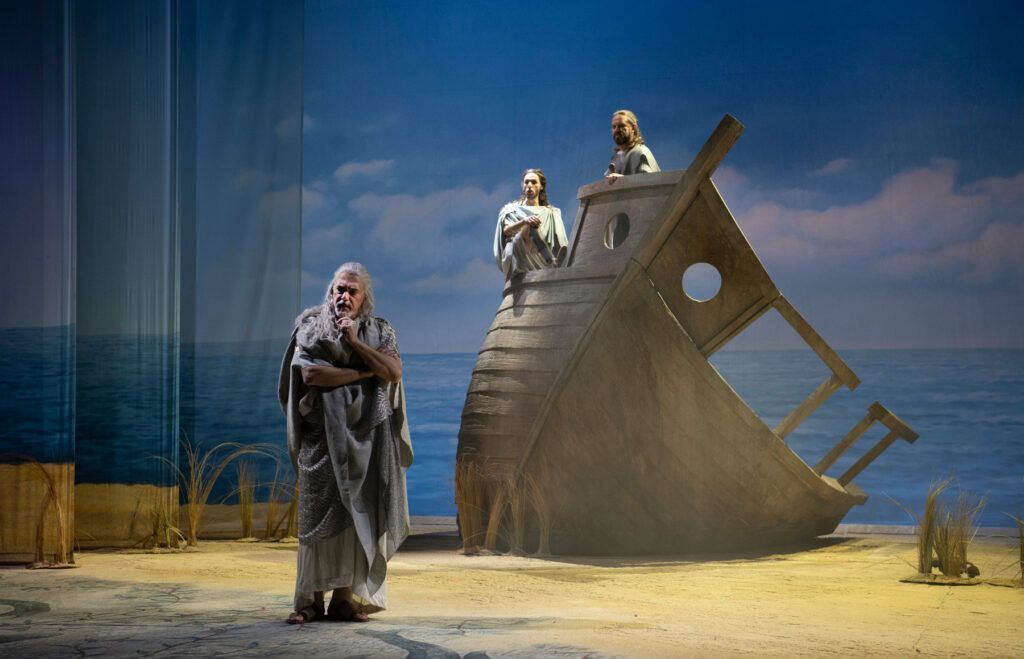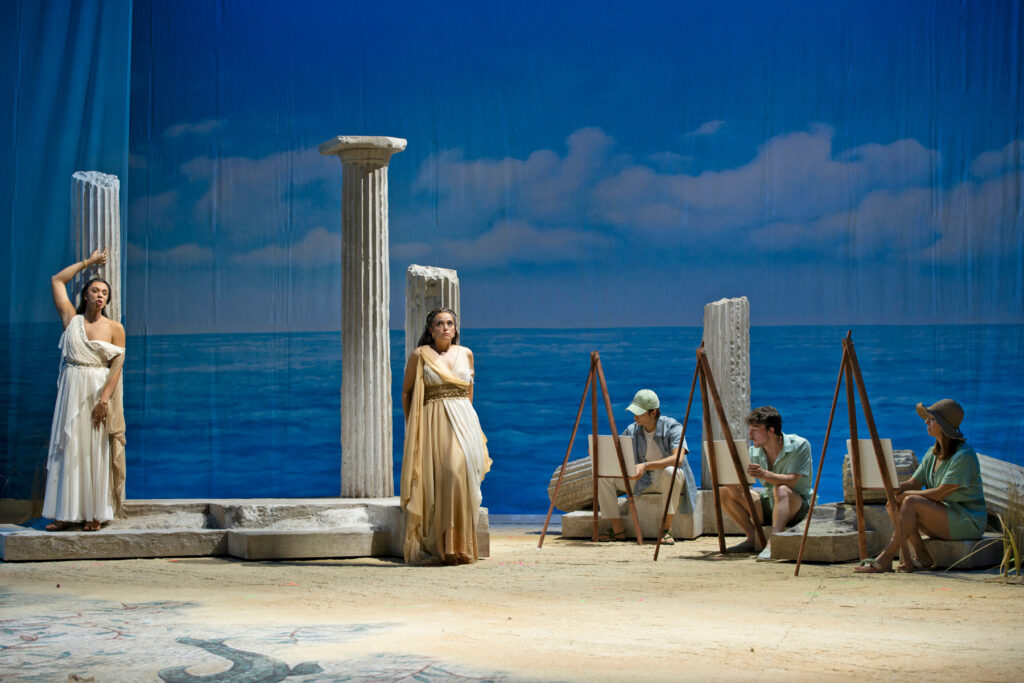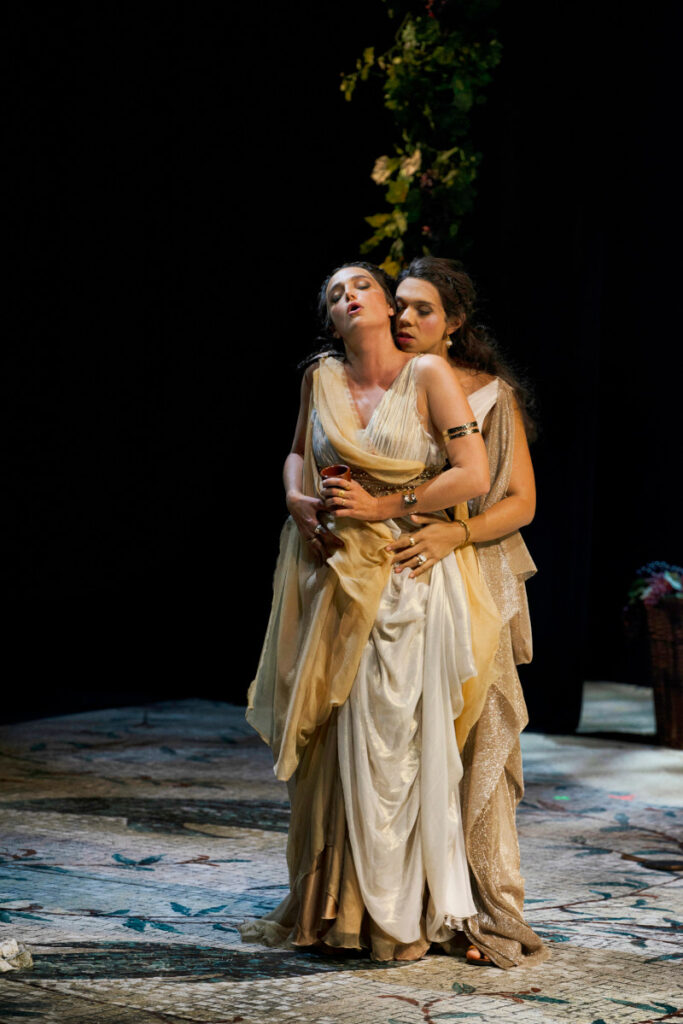In the last three or so of his operas, Handel demonstrated a fascinating move towards mixing elements of comedy within the format of opera seria that he had worked with almost consistently ever since his journey to Italy over three decades previously, as he attempted to excite London audiences’ waning interest in Italian opera at the end of the 1730s. Still quite far removed from the emerging genre of opera buffa, if he had the chance to continue that new development of these late operas, he may have evolved another, distinct form of music drama alongside the English oratorios he went on to perfect in the 1740s.

George Petrou’s production of the very last opera, Deidamia (1740) enticingly balances the work’s comic and tragic elements, coming together in an ultimately provocative but rewarding meditation on myth-making and warfare. Set on the eve of the Trojan War, the young Achilles has been spirited away to the court of King Lycomede on the island of Skyros and disguised as a woman (Pyrrha) to try and avert a prophecy that, if he is sent to war alongside his fellow Greeks, he will die. In the meantime, he has fallen in love with Deidamia, Lycomede’s daughter, setting up the conflict between romance and duty that arises when Odysseus comes to track down Achilles and lead him to Troy. Achilles inadvertently lets the mask slip when a box of trinkets is put before him and he reaches for the arms of war, revealing his status as a warrior, instead of the clothes and ribbons on display.
Cross-dressing and avoiding the call up to war already subvert the themes of heroic masculinity and the glorification of warfare, which are central to Homeric epic (tellingly, the sources for the story come from a much later period in Classical literature). Petrou takes the satire a step further by setting the action against the backdrop of Skyros in the present day as a holiday resort where tourists are invited to enact their own myths. A group of silent extras visit the island for a wedding, and play out their fantasies and desire for diversions around the ancient drama that unfolds.

The opera’s episodes are cleverly made to correspond ironically to the programme set out for the modern visitors, for example as they examine the island’s ruins and the beach at which Odysseus has arrived; the wedding which suffers a temporary setback with a fracas among the lovers; Lycomede’s hunt inciting the occasion for a shoot-your-own supper at the local taverna; and the box of trinkets as the exhibits found in a museum. It brings into witty and thoughtful dialogue the ways in which myths are pressed into service to confirm or refute existing modes of thought, or are commercially exploited today. For all that the opera is named after Achilles’s lover, this interpretation is ultimately focused on his fate, as though the subject of a Greek tragedy: having been seen dead at the beginning, the drama ensues as the retelling of how he came to join the Trojan War, and at the end he succumbs to the fatal wound of his heel during the upbeat concluding chorus.
In the title role, Sophie Junker sings incisively and expressively, particularly in her sombre, self-pitying numbers, underlining the production’s tragic thrust. Bruno de Sá brilliantly acts out the absurdity of the mighty Greek warrior dressed up as a woman, playing up the ambiguity in identities around gender and sexuality already implied by the original scenario. Staggering about in a clumsy, unladylike fashion, Deidamia shows him how to deport himself appropriately in disguise. But as a self-described ‘male soprano’, with a higher and more agile range than a more standard countertenor, his colourfully volatile vocal production brings us as close as possible to the more complicated understandings of manhood posed by the phenomenon of the castrato in such Baroque operas.

Countertenor Nicolò Balducci is smoother voiced and liquid in sonority, aptly characterising Odysseus’s wiliness with an entrancing lustre as he seeks to uncover Pyrrha’s true identity. Dubiously testing ‘her’ physicality with something of a sexual embrace brings homoerotic tensions to the fore, just as the interactions between Deidamia and Achilles in female form. Rory Musgrave is vocally more forthcoming as Phoenix, another member of the embassy for Achilles, direct in his addresses to the latter as also to Deidamia’s confidante, Nerea, to whom he takes a liking. Sarah Gilford brings charm and warmth to that role, as also does Petros Magoulas in the part of Lycomede, almost purring in the downward slides of the mellow aria where he reflects on age.
Conducting as well as staging this opera, Petrou leads an energised account of the music with the Wexford Festival Opera Orchestra. A little more numerous than his usual ensemble, Armonia Atenea, they bring much vigour to the diverse succession of arias, but without becoming rushed. Even though slower arias don’t linger, they each develop an idiomatic rhythmic charisma, sustaining a dynamism that runs through the whole performance. As a huge fan of Handel’s operas, this is one of the most fun as well as insightful productions of any of the whole canon I’ve had the pleasure to see.
Curtis Rogers
Deidamia
Composer: George Frideric Handel
Libretto: Paolo Antonio Rolli
Cast and production staff:
Deidamia – Sophie Junker; Nerea – Sarah Gilford; Achilles – Bruno de Sá; Odysseus – Nicolò Balducci; Phoenix – Rory Musgrave; Lycomede – Petros Magoulas
Stage Director & Conductor – George Petrou; Set & Costume Designer – Giorgina Germanou; Projection Designer – Arnim Friess; Lighting Designers – Daniele Naldi & Paolo Bonapace; Wexford Festival Opera Orchestra
Wexford Festival Opera, National Opera House, Wexford, Ireland, Saturday 18 October 2025
Top image: Nicolò Balducci, Sophie Junker and Bruno de Sá and members of the cast.
All photos by Pádraig Grant.